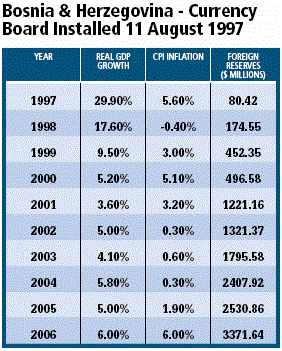
In 1997, bulgaria and bosnia and herzegovina, which is commonly known as Bosnia, introduced currency board systems on July 1 and August 11 respectively. With a currency board system, a monetary authority issues a domestic currency that is convertible into an anchor currency at a fixed rate. Confidence in the domestic currency is established because the monetary authority must hold foreign reserves to fully cover the domestic currency that is issued.
Prior to the introduction of their currency board systems, both Bulgaria and Bosnia were in bad shape. Bulgaria had defaulted on its international debt, narrowly escaped a revolution in late 1996, and was battling hyperinflation (a rate of inflation per month that exceeded 50%) that had virtually wiped out its banking system and sent the real economy into a free fall. It is worth noting that hyperinflations are rather rare. There have only been 30 in history, with Bulgaria’s 1997 hyperinflation being the last one in the twentieth century and Zimbabwe’s current hyperinflation being the first in this century.
 The newly independent Bosnia and Herzegovina had just come out of a bloody civil war, one that had disrupted and displaced most of the population, destroyed 18% and damaged 60% of the housing stock, and covered much of the territory with land mines. Its economy was in shambles, declining to about 20% of the 1990 level. With the exception of the deutschemark, the other three currencies in circulation— the Bosnia and Herzegovina dinar, the Croatian kuna, and the Yugoslav dinar—were either unstable or very unstable.
The newly independent Bosnia and Herzegovina had just come out of a bloody civil war, one that had disrupted and displaced most of the population, destroyed 18% and damaged 60% of the housing stock, and covered much of the territory with land mines. Its economy was in shambles, declining to about 20% of the 1990 level. With the exception of the deutschemark, the other three currencies in circulation— the Bosnia and Herzegovina dinar, the Croatian kuna, and the Yugoslav dinar—were either unstable or very unstable.
In both Bulgaria and Bosnia, I had an opportunity to play a role in designing and implementing their currency reforms. In 1991, I co-authored with Kurt Schuler a monograph Teeth for the Bulgarian Lev: A Currency Board Solution. After its publication, I began to visit Sofia to introduce the currency board idea to government officials and the public.
In particular, I can recall my meetings over the years with Todor Vulchev who served as Governor of the Bulgarian National Bank from January 1991 to January 1996. He had studied my proposal carefully and understood it. Indeed, during our meetings, he required no staff prompting. From our first meeting until the last, Vulchev’s position remained the same: “We at the BNB are in full control and can’t envision a scenario in which that wouldn’t be the case. In consequence, we have no need for currency board rules.”
These conclusions were echoed in official circles until late 1996. Faced with a hyperinflation and an economic collapse, the official resistance to the currency board idea began to crumble. What forced it to completely collapse was a turn in public opinion as well as a revolt carried out in the streets of Sofia.
The public had lost all confidence in the government and the BNB. Instead, it embraced the currency board idea. As an indicator of the public’s support for the currency board idea, consider that one of my books, Currency Boards for Developing Countries, had been translated into Bulgarian and reached the top of Sofia’s bestseller list in early 1997.
In March 1997, President Petar Stoyanov appointed me as his economic advisor. My immediate task was to draft a currency board law and assist in implementing it. On July 1, 1997, Bulgaria introduced a currency board law to govern the BNB.
Among other things, this episode is further evidence to confirm a conclusion made by Milton Friedman in his memoirs: “I have long believed that we do not influence the course of events by persuading people that we are right when we make what they regard as radical proposals. Rather, we exert influence by keeping options available when something has to be done at a time of crisis.”
 In Bosnia, the currency board system was mandated in the Dayton/ Paris Treaty (December 1995) ending the civil war. To assist in the implementation of the new currency board system, I was invited to Sarajevo in December of 1996. And what a trip it was: military transport flights, armored cars, bodyguards and other local oddities.
In Bosnia, the currency board system was mandated in the Dayton/ Paris Treaty (December 1995) ending the civil war. To assist in the implementation of the new currency board system, I was invited to Sarajevo in December of 1996. And what a trip it was: military transport flights, armored cars, bodyguards and other local oddities.
At the time of their installation, critics claimed that neither currency board would succeed because Bulgaria and Bosnia didn’t meet preconditions required for a successful currency reform. Those who peddle this precondition notion claim that a currency board is unlikely to be successful without the solid fundamentals of adequate reserves, fiscal discipline and a strong and well-managed financial system, in addition to the rule of law.
The preconditions argument falls into what I term the “95% Rule”:95% of what is written about economics is either wrong or irrelevant. Just look at the accompanying two tables. In the last decade, Bulgaria and Bosnia have experienced sustained economic growth, stable prices and a rapid increase in the demand (as reflected in the growth in foreign reserves) for the currencies produced by their currency board systems.
I dare say that Indonesia’s economy would be in better shape today if it had followed the sound money path taken by Bulgaria and Bosnia ten years ago.
Author Steve H. Hanke

0 responses on "Bulgaria and Bosnia After Ten Years"